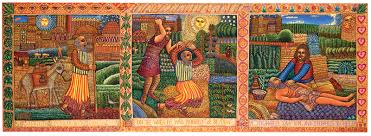 St Alban’s Episcopal Church Bolivar, Missouri Wednesday, July 6, 2022 Amos and Luke for next Sunday Amos 7:7-17 You might really want to read more of Amos than just this passage. But this alone is pretty dramatic. Amos was given the image of a plumb line and hears God say that he is “putting a plumb line in the midst of my people Israel,” (to show them how far “off” they are. Amos warned the people and the priest, and through him, the king, that although they all think they are doing well, God’s people actually are not. And he warned that God intended to allow them to be defeated and to go into exile far from their home until they learn. It’s a kind of a cosmic “time out.” But the times seemed peaceful and prosperous, the priest was unhappy and told the king, “…the land is not able to bear his words.” He orders Amos to go on back to where he belongs – “Never prophesy again at Bethel, for it is the king’s sanctuary, and it is a temple of the kingdom.” You can read to see how well that speech worked out.  Luke 10:25-37 You know this story – a lawyer tries to trap Jesus in a theological mistake by asking him, “What must I do to inherit eternal life?” Eventually, after a bit of verbal sparring, Jesus tells the story we call, “The Good Samaritan.” It wouldn’t have had that title when it was first told. Samaritans were the bad guys, only half-Jewish, with weird customs and religious behavior. They were definitely not the heroes of any Jewish story. Decent people would do out of their way to avoid having to pass through Samaria. So when Jesus makes the religious good guys, the priest and the Levite into bad guys; and the bad guy, the Samaritan into a good guy, he was deliberately turning the listener’s world on its head. What should le good, was not. What was assumed to be dangerous and bad – was good. It was only the unholy man – not one of the holy ones – who “was a neighbor to the one who fell into the hands of the robbers.” In both Amos and Luke, the careful religious professionals come off badly. They do not care for God’s people: the oppressed, the neglected, and the abused.   |

Categories:
Tags:
No responses yet